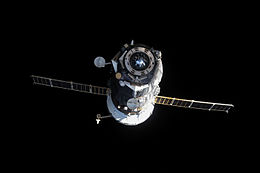 Progress M-28M shortly after undocking from the ISS on 19 December 2015. | |
| Mission type | International Space Station resupply |
|---|---|
| Operator | Roscosmos |
| COSPAR ID | 2015-031A |
| SATCAT no. | 40713 |
| Mission duration | 169 days |
| Spacecraft properties | |
| Spacecraft type | Progress-M s/n 428 |
| Manufacturer | RKK Energia |
| Launch mass | 7282 kg |
| Start of mission | |
| Launch date | 3 July 2015, 04:55:48 UTC[1] |
| Rocket | Soyuz-U |
| Launch site | Baikonur Site 1/5 |
| End of mission | |
| Disposal | Deorbited |
| Decay date | 19 December 2015, 11:28 UTC |
| Orbital parameters | |
| Reference system | Geocentric[2] |
| Regime | Low Earth |
| Perigee altitude | 263 km |
| Apogee altitude | 289 km |
| Inclination | 51.65° |
| Period | 90.03 minutes |
| Epoch | 3 July 2015 |
| Docking with ISS | |
| Docking port | Pirs |
| Docking date | 5 July 2015, 07:11 UTC |
| Undocking date | 19 December 2015, 07:35 UTC |
| Time docked | 167 days |
| Cargo | |
| Mass | 2381 kg |
| Pressurised | 1393 kg |
| Fuel | 520 kg |
| Gaseous | 48 kg |
| Water | 420 kg |
Progress ISS Resupply | |
Progress M-28M (Russian: Прогресс М-28М), identified by NASA as Progress 60P was a Progress spacecraft used by Roskosmos to resupply the International Space Station (ISS) during 2015. It was launched on 3 July 2015, less than a week following the failure of SpaceX CRS-7 and the previous failure of Progress M-27M to deliver cargo to the ISS.[3] The 28th Progress-M 11F615A60 spacecraft launched has the serial number 428 and was built by RKK Energia.
- ^ McDowell, Jonathan. "Launch Log". Jonathan's Space Page. Retrieved 3 July 2015.
- ^ Peat, Chris (4 July 2015). "PROGRESS-M 28M - Orbit". Heavens-Above. Retrieved 4 July 2015.
- ^ Shively, Nick (2 July 2015). "Russia to launch supplies to International Space Station tonight". LA times. Retrieved 3 July 2015.